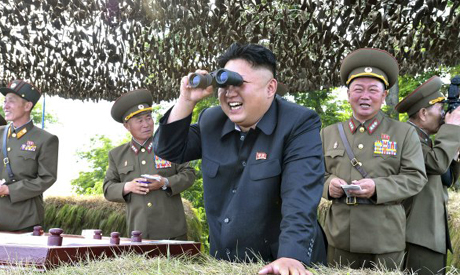
File photo of North Korean leader Kim Jong Un looks through a pair of binoculars during an inspection of the Hwa Islet Defence Detachment standing guard over a forward post off the east coast of the Korean peninsula, in this undated file photo released by North Korea's Korean Central News Agency (KCNA) in Pyongyang on July 1, 2014. (Reuters)
North Korea's claim Wednesday that it had carried out a successful hydrogen bomb test drew swift condemnation from friends and foes alike, with China saying it "firmly opposes" its neighbour's actions as others blast it as an intolerable provocation that must be punished.
Several governments promised a firm response as tensions soared again in northeast Asia, with many calling for further action by the United Nations against the hermit nation, which is already subject to heavy international sanctions.
Russia on Wednesday slammed the claimed testing of a hydrogen bomb by North Korea as a clear breach of international law that could enflame tensions across the region.
"If this test is confirmed then it will be a new step by Pyongyang on the path of developing nuclear weapons, which is a flagrant violation of international law and existing UN Security Council resolutions," Russia's foreign ministry said in a statement.
China, North Korea's most important diplomatic partner, took a more nuanced stance than others, saying it "firmly opposes" the test and would summon Pyongyang's ambassador for "solemn representations", but adding that dialogue was the "only practical way to resolve the relevant issue".
Beijing is Pyongyang's key provider of aid and trade but relations have become more strained in recent years, in part because of North Korea's persistence with its nuclear programme in the face of international condemnation.
North Korean leader Kim Jong-Un has yet to visit Beijing since coming to power following the death of his father four years ago.
"We strongly urge the DPRK side to remain committed to its denuclearisation commitment, and stop taking any actions that would make the situation worse," foreign ministry spokeswoman Hua Chunying told a regular briefing, using the North's official name.
South Korean President Park Geun-Hye described the test as a "grave provocation" at an emergency meeting of the Country's National Security Council (NSC) convened immediately after the news broke.
"The test is not only a grave provocation to our national security but also a threat to our future... and a strong challenge to international peace and stability," she said, calling for strong sanctions on Pyongyang.
In an earlier statement, Seoul said it would "take all necessary measures including additional sanctions by the UN Security Council... so that the North will pay the price for the nuclear test".
Japanese Prime Minister Shinzo Abe slammed the test as "a serious threat to the safety of our nation".
"This clearly violates UN Security Council resolutions and is a grave challenge against international efforts for non-proliferation," he said in Tokyo, adding his country would seek to coordinate efforts among UN members to deal with the action.
In Washington, the White House would not confirm the test, but vowed to "respond appropriately to any and all North Korean provocations".
Fellow UN Security Council permanent members France and Britain joined in the chorus of condemnation.
Speaking in Beijing, Britain's foreign secretary Philip Hammond said the test was "a grave breach of UN Security Council resolutions and a provocation".
Paris labelled the move an "unacceptable violation" of UN resolutions and called for a "strong reaction from the international community".
Australian foreign minister Julie Bishop said her country "condemns in the strongest possible terms" the test, which "confirms North Korea's status as a rogue state and a continuing threat to international peace and security", adding that Canberra would express its concerns to Pyongyang directly and call for stronger UN sanctions.
The test, which came just two days before leader Kim Jong-Un's birthday, was initially detected by international seismology monitors as a 5.1-magnitude tremor next to the North's main Punggye-ri nuclear test site in the northeast of the country.
Last month, North Korean leader Kim Jong-Un suggested Pyongyang had already developed a hydrogen bomb.
The claim was questioned by international experts and there was continued scepticism over Wednesday's test announcement.
Whether an H-bomb or not, it was North Korea's fourth nuclear test and marked a striking act of defiance in the face of warnings that Pyongyang would pay a steep price if it continued pursuing its atomic weapons programme.
The three previous tests in 2006, 2009 and 2013 triggered waves of UN sanctions. Their failure to prevent a fourth detonation will see calls for more drastic Security Council action this time around.
Short link: